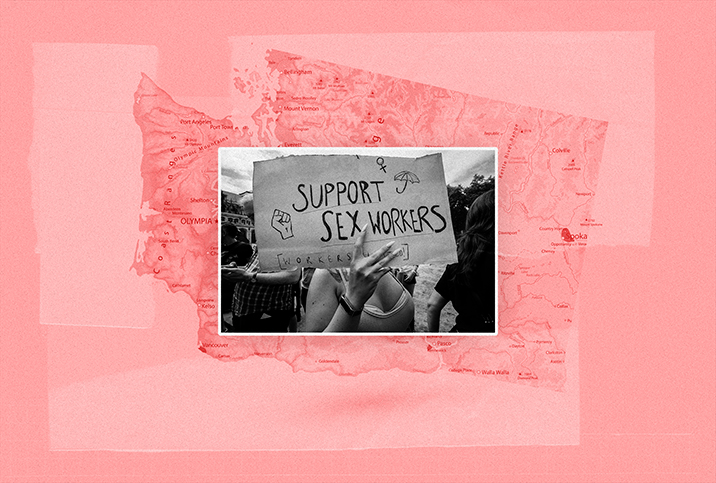Paving the Path to Decriminalization in Oregon and Beyond

In an informal hearing held by the Oregon House Judiciary Committee on June 3, 2021, members of the Oregon Sex Workers Human Rights Commission, a sex worker-led and -powered group, pressured for the passage of House Bill 3088, introduced by Representative Rob Nosse (D-Portland). The bill would repeal crimes of prostitution, commercial sex solicitation and promoting prostitution.
After the hearing, the commission held a virtual press conference in which activists, academics, political figures and various organizations detailed why decriminalization of sex work is the only path forward. Such organizers work thanklessly to end the criminalization of sex work, which causes violence and hurts people already at risk. While HB 3088 won't reach the governor this legislative session, the goal is to get statewide decriminalization on the 2022 ballot.
Widespread support for decriminalization
The movement toward decriminalization isn't happening only in Oregon. Progress is underway in various pockets throughout the country and beyond. Activist and attorney Melissa Sontag Broudo said this is promising.
"We truly are sitting at the precipice of significant legislative change on a national level [for] this issue," Broudo said. "This year alone, Oregon, with HB 3088, but also New York and Massachusetts, and in prior years Vermont and New Hampshire, introduced decrim legislation."
There are plenty of studies and statistics to support how decriminalization decreases violence. A 2018 study by Johns Hopkins affirms the relationship between increased policing and increased violence of sex workers. Barb Brents, Ph.D., professor of sociology at the University of Nevada, is part of a group of 250 scientists who championed Scientists for Sex Worker Rights and urges listeners to "please trust the science." Other states and countries have already found success with decriminalization.
"In New Zealand, for example, under the Prostitution Reform Act, when prostitution was decriminalized in 2003, empirical studies have shown that among street-based sex workers, they reported a significant and positive change in their previously negative relationships with law enforcement and reported safer working conditions," said Angela Jones, Ph.D., professor of sociology at the State University of New York.
Effects of criminalization
The Oregon Sex Workers Human Rights Commission will hold a public hearing on July 15, 2021, to educate the public on the detrimental impacts of criminalization, which are far-reaching. For example, if workers report assaults or robberies, they fear arrest or deportation. Sex worker and activist Savannah Sly has pointed out the inherent danger of this.
"Predators intentionally target sex workers because we have no legal access, no legal recourse, due to our criminal status," Sly said.
The stigma and discrimination sex workers face makes it harder to transition jobs and thwarts access to housing, education, banking and health services. Criminalization also fails to address systemic issues and hurts the marginalized communities most frequently targeted by police, such as migrants, trans people and the BIPOC (Black, Indigenous and people of color) community.
"We are reckoning with the criminal justice system, especially because of BLM (Black Lives Matter)," Broudo said. "The criminal justice system as we know it is unreliable. Sex workers have always known that."
Decriminalization vs. legalization and regulation
Decriminalization is the only model that addresses racial and gender disparities. Other models include the full legalization of sex work or the Nordic model, which criminalizes people who pay for sex work but not those who provide it.
Activist, sex educator and sex worker Elle Stanger explained why many activists fight for decriminalization over legalization.
"Legalization models, which would require potential permits, applications, registration, address, government name listed, don't help the most at-risk people, such as immigrants, minors, queer and trans people," Stanger said. "Any type of criminalization hurts."
Regulation also doesn't help. Laws that have failed sex workers often conflate sex work and human trafficking, which are polar opposite sides of the sex industry spectrum. Human trafficking involves coercion and exploitation, whereas sex work is consensual or carried out to make a living. One problem is that most laws try to include all things related to sex work and trafficking under the same umbrella whereas decriminalizing sex work decreases human trafficking and emboldens human rights. When sex work is decriminalized, there can be actual work and resources devoted to investigating the systemic causes of exploitation. Criminalization increases exposure to trafficking, and those who need help won't reach out for fear of arrest.
Sex work activists urge the public to pay attention to the lived experiences and knowledge of actual sex workers to better understand the push for decriminalization. Alex Andrews, the founder of Sex Workers Outreach Project (SWOP) Behind Bars, said, "I fight particularly hard for those who have a voice but have been silenced by a society that doesn't listen to, or honor, the stories they have to tell."
Sex work is never going away
Oregon has the opportunity to pioneer human rights efforts through decriminalization, which offers a simple premise: sex workers have bodily autonomy and deserve the same working conditions as workers in other industries, complete with adequate resources and without fear of prosecution.

















